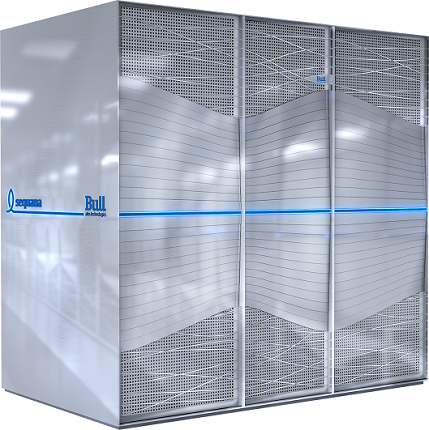The Hartree Centre team is working closely with Washington University School of Medicine who lead the Folding@home project, which allows a global community of contributors to lend unused background capacity on their personal computers to power simulations of target drug interactions. While there is plenty of compute power available to run these simulations, creating the drug structures to be simulated uses complex and memory-intensive methods that requires supercomputers. Creating these drug structures has therefore become the bottleneck in using the vast amount of compute power available across Folding@home.
By using some of the capability of the Hartree Centre’s Atos BullSequana X1000, the team are accelerating this process and creating new drug structures to be simulated fully across Folding@home’s distributed compute power.
The Atos BullSequana X1000 systems at Hartree are also being used to support the work of CompBioMed, the European Centre of Excellence in Computational Biomedicine, as part of a global effort which includes hundreds of researchers from across the US and Europe to tackle different aspects of Covid-19. As an interim measure before a vaccine can be produced, pharmaceuticals are needed that can reduce the severity of the disease or that can be used as a preventive measure. This requires thousands of compounds to be screened in the form of advanced simulations, demanding high levels of compute power. The Hartree Centre systems are being used as part of an exceptional array of supercomputers across the world that are being harnessed to undertake these simulations.
Alison Kennedy, Director of the STFC Hartree Centre, said: “We have a hugely powerful supercomputing capability at our disposal here at the Hartree Centre, so our staff were naturally looking for opportunities to contribute to global computational efforts to tackle the COVID-19 pandemic. The way the folding@home project works is to take a possible compound and use computer simulations to see how it interacts with the virus. It’s not a way to provide a vaccine, but if suitable antiviral compounds are identified, it could help to treat patients who have contracted the virus, which could help them to get better more quickly and reduce the burden on critical healthcare services.”
The team hopes to identify antiviral therapeutics that disrupt one or more of the proteins necessary for the lifecycle of COVID-19, which would help to prevent the further spread of the virus.
Andy Grant, Global VP, Large Strategic HPC Deals, Atos, added: “Whether testing new compounds or performing target drug simulations at speed, analytics supported by super computers are uniquely placed to aid in the search for potential treatments of COVID-19. The UK has consistently been at the forefront of science and medicine and it is pleasing to see this country playing a key role in what has become an enormous coordinated international endeavour.”
Atos works with the Hartree Centre, located at Daresbury Laboratory, in support of closer collaboration between academia and industry through the power of supercomputing and deep learning.




